Personnel: Willie Moore (trumpet); Dickie Harris (trombone); Arnett Cobb (tenor sax); Johnny Griffin (baritone sax); George Rhodes (piano); Walter Buchanan (bass); Al Walker (drums).
Recorded in New York, August 7th, 1951. Released in early October 1951.
Listen to "Cocktails For Two"
Listen to "Walkin' Home"
Billboard review from 6th October, 1951:
"Walkin' Home" - "Cobb's sharp combo drives fluidly through an easy riffer akin to "Smooth Sailing." The leader blows up a mess of tenor. There's as much jazz appeal here as there is danceability for juke players."
"Cocktails For Two" - "Group opens and closes with a pulsing Latin beat and swings out in between with Cobb's tenor pulsing all the way. A fine disking, well recorded, which could stimulate action."
Arnett Cobb belongs to the legion of legendary Texas tenormen. Born in Houston in 1918, Cobb started out in the local bands of Frank Davis and Chester Boone from where he was recruited in 1936 by Milt Larkin who led an aggregation which soon achieved a formidable reputation throughout the Southwest territory and beyond. Larkin's reed section featured Cobb and Tom Archia on tenor sax and Illinois Jacquet and Eddie "Cleanhead" Vinson on alto. Jacquet left in 1939, moving to California where he eventually joined the new Lionel Hampton big band on tenor sax. Vinson left at the turn of 1941/42 to join the Cootie Williams Orchestra after Cootie had attempted to lure Arnett Cobb away from Larkin.
Count Basie also tried to sign Cobb who remained with the Larkin outfit until 1942 when he replaced Illinois Jacquet (who had joined the Cab Calloway Orchestra) in Lionel Hampton's band. Cobb's big, big toned tenor was heard to brilliant effect in Hamp's 1944 version of "Flying Home", known as "Flying Home No. 2." Other showcases for Cobb included "Cobb's Idea" and "Adam Blew His Hat."
In early 1947 Arnett Cobb left the Hampton orchestra, formed his own small combo and signed for Apollo Records. His best selling disc for that label was a two part version of "When I Grow Too Old To Dream," the first part being an affecting instrumental while the second part featured exaggeratedly hep vocals. Arnett's career came to a temporary halt in early 1948 due to a failed spinal operation. He didn't start recording again until September 1950 when he began a two year stint with Columbia and its Okeh subsidiary. His most successful release at this time was "Smooth Sailing" from his first Columbia session. In 1953 he moved to Mercury Records, in 1954 - 55 he had three releases on Atlantic and in early 1956 he cut "No Dues" / "Slats" for Vee-Jay.
 |
| Swingin' Cobb - William Gottlieb collection |
 |
| His name misspelled in lights - William Gottlieb collection |
With thanks as ever to El Enmascarado for his sterling work in reviving this 78 rpm disc.
Recommended listening for Arnett's early small group sides - "A Proper Introduction To Arnett Cobb - The Wild Man From Texas" (Proper Intro CD 2070).











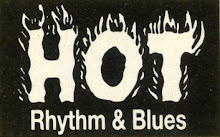
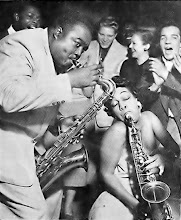




.jpg)


%2045%20-%2060827A.png)
















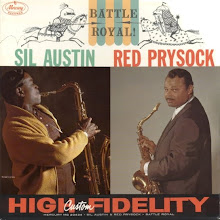
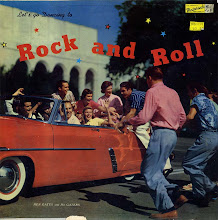
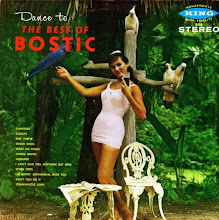
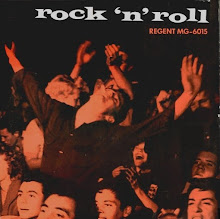
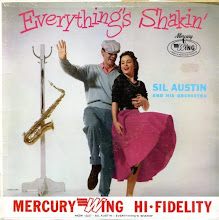






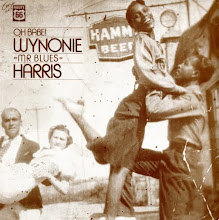

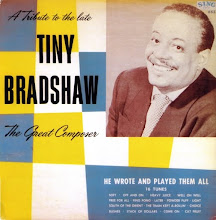





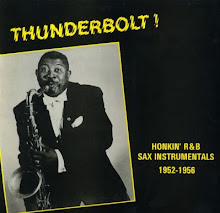

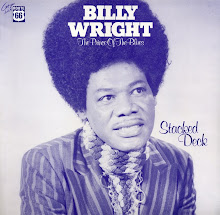






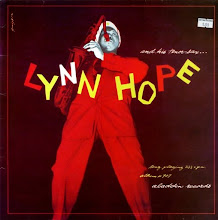



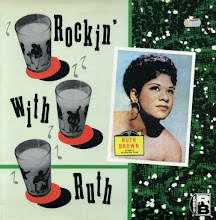


6 comments:
Yeah! This one didn't need much reviving at all, as it was in such spiffy shape. I pretty much just ripped it and sent it off. Enjoy! The Masked One
Absolute pleasure to start the Saturday morn with Mr Cobb. Thanks!
Great! I like this very much: "The leader blows up a mess of tenor. There's as much jazz appeal here as there is danceability for juke players"
Cheers from Argentina
Love this one. The quality of the rip is impressive. This might be a dumb question, but is it possible to download? Thanks
Hi Hugh, there's no download of this at present. It will be available for download when the next volume of "Jump and Jive on 78" is compiled from El Enmascarados' 78rpm rips.
Greetings,
This past week I've been fearing the worst, expecting your blog to disappear like so many others. It seems to have survived the latest rounds. Thank you for all your hard work over the years, all of you.
I'm enjoying it as long as I can!
Post a Comment